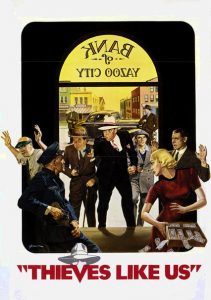Thieves Like Us-1974
Director Robert Altman
Starring Keith Carradine, Shelley Duvall
Top 250 Films #190
Scott’s Review #1,071
Reviewed October 16, 2020
Grade: A
The first time I saw Thieves Like Us (1974) I was not blown away. I have forgotten what my original gripe was, but my lackluster star rating on Netflix years ago is confirmation of such.
All is now forgiven and like a fine wine, this film gets better and better with each viewing.
It’s a gangster film, but a heart-wrenching story containing one of the sweetest romances in cinema history.
Based on the novel of the same name by Edward Anderson, director Robert Altman, famous for allowing his actors to ad-lib their lines to their heart’s content and peppering his films with overlapping, “real-life” dialogue, limits this technique this time around.
His stars, Keith Carradine and Shelley Duvall, regular fixtures in his films, are the main attraction, but supporting players like Louise Fletcher, Bert Remsen, and John Schuck give tremendous performances.
Set in the 1930s United States, Deep South Mississippi, the time-period and location are key elements to the success of the film.
Having never set foot in this geographical area, I nonetheless found myself escaping there and ruminating about what it would have been like to live there in the Great Depression era.
The many outdoor sequences with trees, forests, country roads, and home-cooked meals provide a luminous atmosphere and texture.
Small-town living never felt so good and cozy.
Wisely, Altman steers clear of any racial overtones or dialogue within the film. The film is not about that.
There appear many black characters mostly in the background, townspeople scenes, or as prisoners which add flavor. But they are represented as living among other folks without any aggression or stereotypes. They simply are and it feels like the South.
Altman crafts an experience of understated, good storytelling, proving a quality film can be quiet and proud, not needing explosive bells and whistles to prove showy. The dialogue crackles on its own and is smart.
The plot is compelling. Bowie (Carradine) is an escaped convict who embarks on a crime spree with fellow former prisoners Chicamaw (John Schuck) and T-Dub (Bert Remsen). While in hiding between bank robberies, Bowie meets a young woman named Keechie (Duvall), and the two quickly fall in love.
A life of crime doesn’t sit well with Keechie, however, so she and Bowie try to settle down, but the law is determined to bring him to justice.
The fun is in watching romance blossom between Bowie and Keechie. Despite Bowie being a criminal, his character contains sweetness and purity that match like a glove with the whimsical truth and simplicity of Keechie.
Throughout the length of the film, I compared the characters to the legendary icons, Bonnie and Clyde, from the self-titled cinema masterpiece.
They are similar but different. The pair sit quietly on the front porch talking about life and the future, optimistically planning their lives together unaware of what fate has in store for them. Their innocence and their goofy humor made me fall in love with them.
The relationship between the three men is apt. They have each other’s backs and are loyal to a fault. The men are convicts and cause death and injury, but there is a humanity that Altman gives to each character.
We do not think of them as derelicts.
When Bowie poses as a sheriff to break Chickamaw from prison, we root for the escape and not for the warden. Bowie kills the warden, shocking Chickamaw. Even with dispute comes caring between the men.
It does take patience to get into this film, probably I did not give the film its due on my first watch. Once the film ended I was left with a feeling of having experienced something of value and an artistic cinematic visionary story.
The homespun characters eating a feast of meat and southern biscuits and discussing the day’s events are rich and atmospheric.
Carradine and Duvall would reunite a year later in another Altman masterpiece, Nashville (1975) playing vastly different characters, both unlikable, so a recommendation is to watch both films back to back to appreciate the dizzying morphed characterization.
Thieves Like Us (1974) is no mere opening act for Nashville but of a different ilk.
The film is a treasure.
